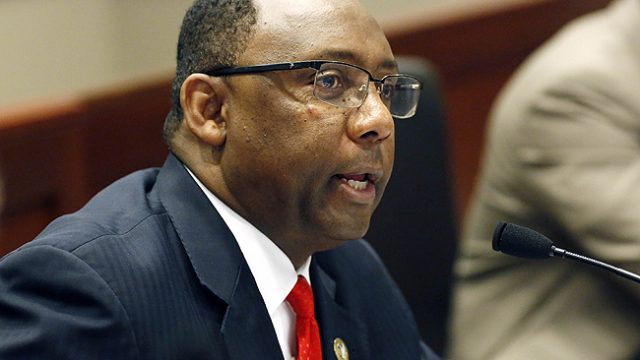No-bid contracts under fire in Mississippi

FORMER CHIEF: Former Mississippi Department of Corrections Commissioner Chris Epps resigned earlier this month after he was accused of money laudering in a 49-count federal indictment.
By Steve Wilson | Mississippi Watchdog
No-bid contracts are becoming pretty unpopular in Mississippi.
And with the scandal at the Mississippi Department of Corrections, it’s little wonder the public is fuming.
No-bid contracts are allowed under state law only for consulting contracts and when a vendor is the sole source for a needed product. In the 49-count federal indictment, former state lawmaker Cecil McCrory and former Mississippi Department of Corrections Commissioner Chris Epps allegedly took advantage of those loopholes.
McCrory was the President of the Rankin County School Board, but resigned the day before the indictment was handed down. He previously was a justice court judge.
State Rep. David Baria, D- Bay St. Louis, wants the Legislature to reassert its oversight on all state agencies using no-bid contracts — not just MDOC — and is calling for hearings when the Legislature returns in January.
“I think this is a systemic problem throughout government,” Baria told Mississippi Watchdog. “This is an example of the type of problem we have when we remove oversight from state agencies and, in particular, state contracts that these agencies enter into. I’d like a complete review of MDOC contracts, but I would like an overall review of state agency contracting policies and procedures to see what we have out there and see what we’re doing to make sure we don’t have waste, fraud or abuse.”
The indictment accuses Epps of receiving kickbacks and bribes to steer corrections deals worth nearly half a billion dollars in contracts, leases or work to companies owned by McCrory. The companies provided telephone and commissary services to state prisons.
Federal authorities say the consulting contract loophole in the law allowed McCrory to pocket thousands of dollars and kick back some of the money to Epps. In his role as commissioner, Epps allegedly pressured private prison operator Management and Training Corp. to hire McCrory as a consultant and pay him $12,000 per month.
Sometimes, the two alleged co-conspirators used both parts of the law to their advantage, authorities allege.
MDOC, under Epps, signed sole-source prison service contracts with companies such as Admin Pros and Keefe Comissary Network that employed McCrory as a consultant. McCrory allegedly kicked back some of his fees to Epps.
Admin Pros’ contract was canceled after the indictment was made public. Gov. Phil Bryant convened a commission to look into the prison contracts with the help of the state Personal Service Contract Review Board and State Auditor Stacey Pickering‘s office. The commission will hold its first meeting December.
However, that might not be enough to satisfy critics of the bidding practices that led to the scandal. Baria said the Legislature needs to consider steps to rein in the practice that opened the barn door for Epps and McCrory’s alleged misdeeds.
“I don’t think it’s a good idea to have no-bid contracts unless they are very, very small, a one-off contract,” Baria said. “So what we have now is no-bid contracts for very, very large projects. When you have a bidding process, you get a benefit for the taxpayer. When there’s no-bid, you don’t have those safeguards, the contractor names their price, which is accepted by a person who doesn’t have (legislative) oversight on some occasions and it can be wasteful.”
Pickering, whose office was part of the multi-agency investigation into the MDOC scandal, told Mississippi Watchdog he’d like to see the Legislature take another look at the issue. He said a balance needs to be struck between meaningful reform and not unnecessarily burdening state agencies with confusing rules on contracts.
“I think it’s going to be something the Legislature is going to want to revisit, to look at, to make sure there are proper internal controls and proper justifications for the decisions that are made,” Pickering said. “We don’t want to overreact and make it so cumbersome that we can’t be efficient and effective on behalf of the taxpayer. If there are any loopholes, if there is an area without sufficient oversight, we need to address those.”
Get regular updates on Mississippi through our Facebook or Twitter accounts







